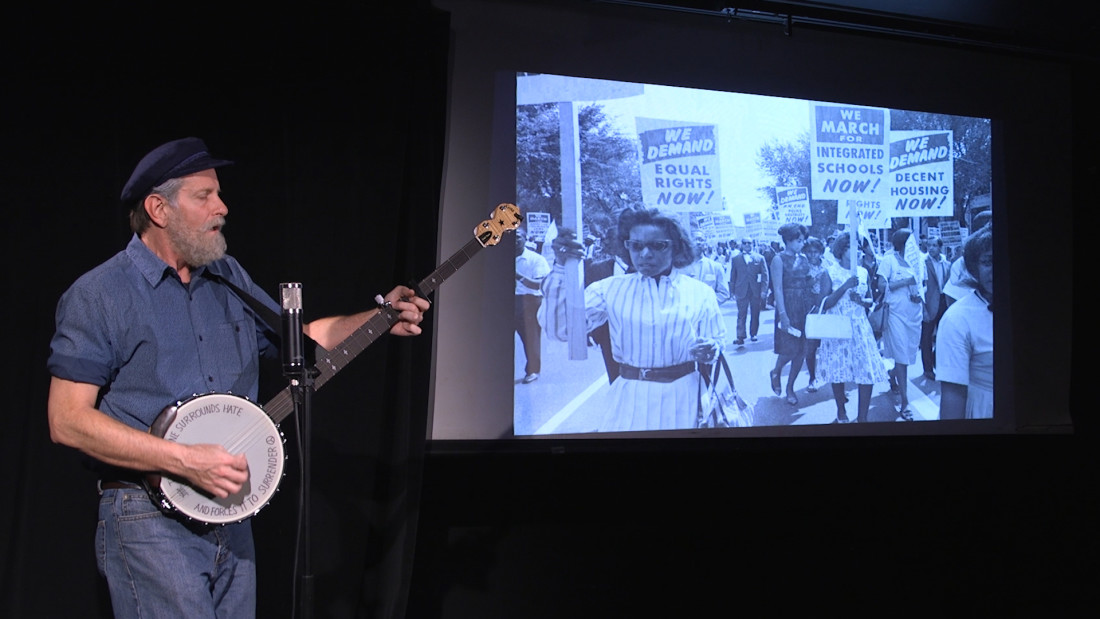Starting in the early 1950s, outspoken folk singer Peter Seeger professed his commitment to freedom of speech, and he paid dearly for it. For nearly two decades, he was blacklisted, unable to perform at prime venues and physically attacked for his beliefs. The musician’s life and enduring songs are recalled in the powerful one-man multimedia show, Seeger, written and performed by Randy Noojin, at N.C. Stage Company through Sunday, June 25.
The timing for Seeger — a great piece of work that celebrates the folk legend who lived until 2014 — is right. Seeger was ensnared in the communist witch hunts of the 1950s: Imagine how he would have reacted to today’s political scene.
While there are intense moments in the production, Noojin lightens it up by poking a lot of gentle fun at banjo pickers such as himself. He also performs many of Seeger’s songs, which became standards. The audience is urged to sing along, and many in the opening-night house at N.C. Stage did just that. A series of historic black-and-white photos, displayed on a screen, added to the realism.
The format of Seeger has the singer performing and speaking at a 1980s meeting of the U.S. Cuban Normalization organization. Seeger was fighting to end the U.S. economic embargo of Cuba. In the 1970s, President Jimmy Carter had loosened the restrictions before President Ronald Reagan tightened the screws again. Ever the optimist, Seeger tells the audience, “I have been surprised by the good things that have happened during my lifetime.”
But there were some tough times, too. Noojin begins telling Seeger’s story, in which the singer gives much credit to his Japanese-American wife, Toshi, who was the family organizer and who kept Seeger pushing through hardships.
After service in World War II, the future folk star began putting his musical career together and raising his family. Seeger’s quartet, The Weavers, became enormously popular on records, and in live and TV performances during the ’50s.
Then, in 1956, the House Un-American Activities Committee called the singer to testify. Though he had long since quit the Communist Party and eventually renounced Soviet dictator Josef Stalin, Seeger believed in his right to free speech and refused to cooperate. He was convicted of contempt, threatened with prison, and his career was in ruins. But Seeger says the boycott let him cast off restrictions placed on commercially successful artists, and he kept right on performing at schools and summer camps.
The boycott stretched into the civil rights era and was only ended by the politically active Smothers Brothers comedy duo, who, like Seeger, refused to be silenced. With their help, Seeger continued to protest, fighting against the Vietnam War and environmental pollution.
Noojin, a longtime actor at the Southern Appalachian Repertory Theatre in Mars Hill, has developed a knack for one-man shows on musical legends such as Hank Williams and Woody Guthrie. In Seeger, he slips into the character and gives impassioned performances of such hits as, “If I Had a Hammer,” “Turn, Turn, Turn,” “Where Have all the Flowers Gone,” “Bring ‘Em Home” and many others.
Seeger celebrates a man who deserves to be remembered, and Asheville is perfect the place to do this show: The musician’s half-sister Peggy Seeger, herself a celebrated folk singer, lived here for many years and was a prominent member of the local music scene.
WHAT: Seeger
WHERE: N.C. Stage Company, 15 Stage Lane, ncstage.org
WHEN: Through Sunday, June 25. Wednesday-Saturday, at 7:30 p.m. and Sunday, at 2 p.m. $14-28.




“Seeger celebrates a man who deserves to be remembered, and Asheville is perfect the place to do this show: The musician’s half-sister Peggy Seeger, herself a celebrated folk singer, lived here for many years and was a prominent member of the local music scene.”
Not only that, but it was a trip to Asheville’s Mountain Dance and Folk Festival as a teenager in the 1930’s that first inspired Pete Seeger to take up the banjo.